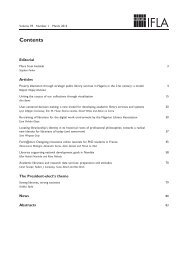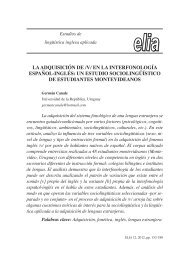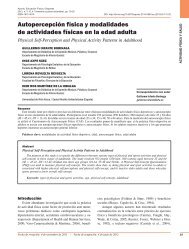wkfHD6mD
wkfHD6mD
wkfHD6mD
You also want an ePaper? Increase the reach of your titles
YUMPU automatically turns print PDFs into web optimized ePapers that Google loves.
Early maladapTaTivE SchEmaS and inTErpErSonal problEmS 121<br />
the results of the projection of the YSQ-SF scales onto the interpersonal circumplex<br />
were in accordance with the hypotheses. The YSQ-SF scales were located in all but the<br />
domineering, intrusive, and overly nurturing octants of the circumplex. Thus, none of<br />
the EMSs seem to be typically associated with these interpersonal themes. The EMSs<br />
of the impaired limits and other-directedness schema domains were homogenous with<br />
respect to interpersonal tendencies and were located in the vindictive and exploitable<br />
octants, respectively. The EMSs of the disconnection/rejection, impaired autonomy, and<br />
overvigilance/inhibition schema domains were spread over several octants.<br />
A number of YSQ-SF scales were located relatively close to the center of the<br />
circumplex. In other words, they had low vector lengths or amplitudes, which is a<br />
measure of differentiation across the eight IIP-C scales. A high amplitude indicates a<br />
defined peak in the profile (Gurtman & Balakrishnan, 1998). Using Gurtman’s (1991)<br />
criterion, five YSQ-SF scales (social isolation, self-sacrifice, subjugation, entitlement, and<br />
insufficient self-control) were strongly related to specific interpersonal tendencies. An<br />
interpretation of low differentiation may be that these EMSs are equally associated with<br />
different interpersonal coping strategies. However, low differentiation can also simply<br />
be the result of common variance due to distress or complaints (Horowitz et al., 1988).<br />
Unfortunately, the design of the current investigation prevent us from concluding<br />
that the social isolation, self-sacrifice, subjugation, entitlement, and insufficient selfcontrol<br />
schemas are associated with specific maladaptive interpersonal coping responses.<br />
Alternatively, it may be that interpersonal problems are partially inherent to the respective<br />
YSQ-SF scales. It has been noted that the YSQ items blend statements assessing cognitions<br />
and behaviors (Bhar, Beck, & Butler, 2012). To resolve this open question, future studies<br />
on the relationship between EMSs and maladaptive interpersonal coping should employ<br />
alternative assessment methods for EMSs. Another shortcoming of the current study<br />
related to the assessment of EMSs is the use of the YSQ-SF, which measures only 15<br />
of the 18 EMSs described in the current schema list. The approval-seeking, negativity/<br />
pessimism, and punitiveness schemas are not covered by the YSQ-SF. Recently, forms<br />
of the YSQ (YSQ-L3, YSQ-S3) have been developed that include all 18 EMSs (Young,<br />
2005). With regard to the participants of the current study, there is an overrepresentation<br />
of depression and anxiety disorders. Unfortunately, a structured assessment of personality<br />
disorders was not conducted for most participants. Given the existing prevalence data<br />
for psychiatric outpatients (Zimmerman, Rothschild, & Chelminski, 2005), it may seem<br />
that personality disorders were underdiagnosed in the present sample.<br />
In conclusion, in line with ST theory, the present study demonstrated that EMSs<br />
and interpersonal problems are closely related. Results of circumplex analyses suggest<br />
that EMSs are associated with a broad range of maladaptive interpersonal behavior.<br />
references<br />
Alden LE, Wiggins JS, & Pincus AL (1990). Construction of circumplex scales for the Inventory<br />
of Interpersonal Problems. Journal of Personality Assessment 55, 521-536. doi: 10.1207/<br />
s15327752jpa5503&4_10<br />
http://www. ijpsy. com © InternatIonal Journal of Psychology & PsychologIcal theraPy, 2013, 13, 1












